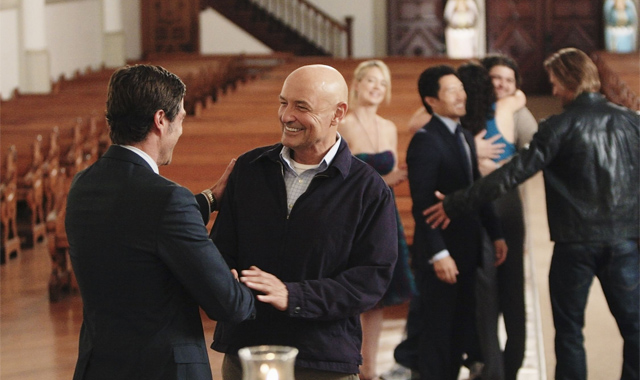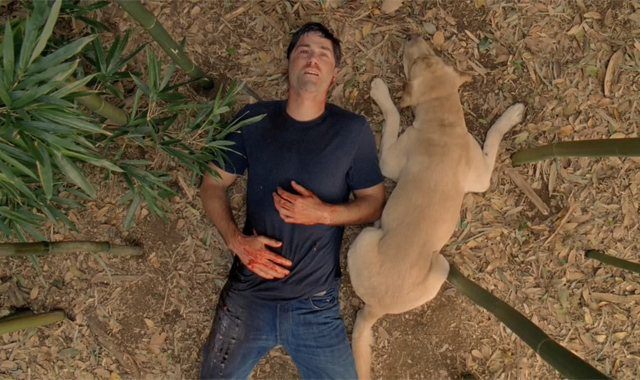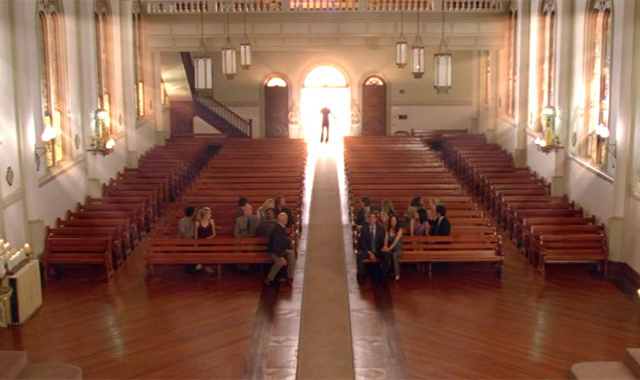Does the Lost finale still hurt?
Three and a half years after it aired, can a Lost fan finally make his peace with the finale? Er, read on...
Warning: contains spoilers for – you guessed it – the Lost finale.
Like millions of others, I watched Lost with a sharply escalating sense of fascination and frustration, and I can’t imagine I’m alone in having felt more of the latter than the former. Over the course of six sensationally strange seasons we were treated to polar bears in paradise, malevolent smoke beasts, dead men walking, nuclear bombs, weird samurais, exploding freighters, a generous dollop of time travel and a wee visit to a parallel universe, to name-check but a few of Lost’s more outlandish narrative flourishes. Nothing wrong with all that. I didn’t tune in expecting gritty realism; I knew that Lost wasn’t The Wire Does Hawaii.
Nevertheless, as I prepared to enjoy the culmination of this bat-shit crazy journey across time, space and Jim Robinson’s career, I asked myself a couple of important questions: ultimately, how did each advancing plot point and seemingly arbitrary, out-of-the-blue cliff-hanger help with our understanding of what the island, and the series itself, was about?; and, after six seasons of evasive – though engaging – story-telling, with little in the way of narrative resolution, would the writers tie up all of the plot strands in a neat little bow, or would they leave their beloved fans hanging?
My main fear was that the writers themselves never knew what the hell was going on, and had been content to roll along, episode to episode, season to season, chucking out twists hither and thither without any creative masterplan to guide them. I could imagine the scene in the writers’ room: ‘Hey, this new twist’ll be cool. It makes absolutely no sense whatsoever, and I don’t know how we’ll write ourselves out of it, but people will be surprised, and that’s the main thing, isn’t it? If viewers start to question how ridiculous it is we’ll just come up with something even more messed up and unbelievable to distract them from the first thing, and then repeat that formula until we get cancelled, or we all just decide to violently murder each other using ball-point pens.’
My second fear was tied to the first: that because of this anarchic approach to story-telling the writers would reach the last episode and opt for a cop-out, leaving a million unanswered questions, and eschewing rational explanation for some sort of mystical, religious piffle, just like the writers of Battlestar Galactica did with their finale.

So what can I say? Were my fears founded?
To accentuate the positives – because there were definitely positives – the finale was emotionally strong. We learned that the off-island action in the final season wasn’t a flash-sideways into an alternate reality, but a flash-forwards into the afterlife. The conceit was an effective one, and certainly kept me guessing until the final reveal. I was expecting the two realities to come clashing together, never suspecting for a moment that I was dealing not with quantum mechanics and string theory, but with good and evil, angels and demons, and the incontrovertible existence of the ‘other side’. I suppose the main reason I didn’t expect this ending was because I didn’t want to believe for a second that my approximately 100 hours of loyal viewership would be rewarded with what in narrative terms felt like callous disregard.
The episode approached its end with most of the main characters sitting in a church in the ‘flash-sideways’ reality, as they prepared to go towards the light. I must admit that the events leading up to this denouement were touching. The islanders, living in a world in which their plane had never crashed – and in which the island itself had sunk in the 1970s – were brought together by fate, and Desmond, and one by one realised the truth of where they really were, who they really were, and what had happened to them on the island (their lives before they’d died). The revelation of their deaths hit each of them like a thunderbolt: they recognised and remembered; romances were rekindled; lovers separated by death were reunited; friendships were re-forged and regrets buried. John Locke walked again, and forgave Ben. Ben stayed out of the church, not quite ready for Heaven. Kate told Jack that she loved him. Sayid and Sawyer got their women back. Aw.
Meanwhile, the action on the island – the real-time, real world – centred on Jack’s newfound acceptance of his role as the island’s protector, and his efforts to stop the smoke monster from using Desmond to rip a plug out of the island’s heart. He was too late. Desmond yanked the plug – surviving the experience thanks to his imperviousness to electro-magnetic energy – causing the island to start disintegrating. Don’t you just hate it when that happens?

Fortunately, though, this process also robbed the smoke monster of his God-like powers, making it a cinch for Jack to kill him. Jack then sacrificed himself to save the island, and his friends, by slotting the plug back into the island’s heart. The series ended with a dying Jack lying on the jungle floor, staring heaven-ward, and finally at peace. We knew where he was headed, so weren’t sad for him: we were happy. He was going to be with the people he loved. Aint that sweet?
As endings go it was pretty insidious. At first I was moved, and let those feelings over-ride my judgment. Minutes later, my brain kicked back into gear and I felt cheated. Cheated out of six years of my life. I wanted to kill the writers – and myself – for believing even for a second that the ending was going to be a proper and satisfying one.
Desmond said it himself prior to pulling the plug: ‘You do realise that whether I pull this plug out and the island is destroyed, or whether you defeat Locke and save the island, it doesn’t really matter.’ No, you’re right, Desmond. But neither did anything else matter. ‘Whatever happened, happened,’ became the show’s catchphrase, and that perfectly sums up the attitude of the writers. ‘Yeah, screw it. Who cares? Just throw another curve-ball.’ The writers seemed to have been more interested in creating a disingenuous symmetry between the bits of random shit they made up – a mysterious Lost ‘Da Vinci Code’ in action – than in creating a credible, satisfying plot, or tying up the disparate, pointless strands of it they’d weaved.
Who put the plug in the island? What was the island? Why was Walt so special when the writers forgot about him after season 3? Why was Walt not in the church at the end? Or Michael? Or Mr Eko? Was this some sort of afterlife apartheid?

Why the hell was Widmore so interested in the island in the first place, and what did he ultimately hope to achieve through his murderous machinations? As enjoyable as it was to shout ‘Is Jim Robinson in every American TV show ever made now?’ at my TV screen each time I saw him, what was the point of Widmore and his evil quest? He seemed superfluous by the end.
If the flash-sideways was limbo, or God’s waiting room, why did so many people ‘die’, and why did so much horrible shit happen in it? What was the significance of all the Dharma Initiative stuff, and the button, and the time travel? In the end they were rendered nothing more than flashy devices used to spin out the show and create new, pointless sci-fi avenues for the writers to explore. I love science fiction and fantasy, both on-screen and in print, and as far as I’m concerned the zanier and bolder it is the better – as long as it’s consistent, and plays by the rules it sets for itself.
In a nutshell then? Yes. My fears were founded.
Perhaps I’m being a little too hard on Lost, but only because I feel cheated. The show had such scope, such potential, and to see it all squandered left me feeling hollow. It’s a crying shame, especially since the first few seasons are so exciting, engaging and enthralling. It’s only as the series rolls closer to its hideous, saccharine, nonsensical climax that the crap begins to set in – and even then the show is always beautiful to look at, and mercifully helmed by a cast of incredibly talented actors.
It would be interesting to watch the whole show again from the beginning, armed with the knowledge of its ending: to see just how big a narrative mess it was. But I don’t care enough. It was only the perpetual sense of mystery that kept me watching, and its disappointing resolution that made me sorry I had. There are plenty more box-sets in the sea.
Read Jamie’s thoughts on The Sopranos finale, here.
Like us on Facebook and follow us on Twitter for all news updates related to the world of geek. And Google+, if that’s your thing!
